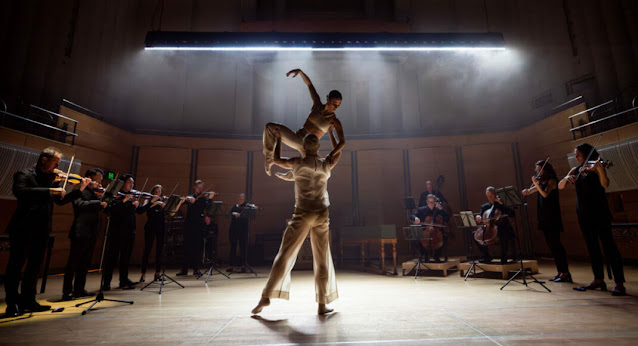 |
| "Silence & Rapture" - Emily Seymour - Liam Green - Australian Chamber Orchestra. |
Directed by
Richard Tognetti – Choreographed by Rafael Bonachela
Lighting by
Damien Cooper – Lighting Technician: Joseph Cox
Llewellyn
Hall, Canberra: 17th August 2024. Reviewed by BILL STEPHENS.
 |
| "Silence & Rapture - Liam Green - Emily Seymour - Iestyn Davies - Australian Chamber Orchestra |
Whether it was the promise of the intriguing combination of the music of Johann Sebastian Bach with that of contemporary Estonian composer Arvo Pärt, or the possibilities offered by the combination of the musicians of the Australian Chamber Orchestra and dancers of the Sydney Dance Company, this concert drew a capacity audience to Llewellyn Hall.
And as the
title promised, for the 75 minutes it took to perform this concert, that
audience, responding to the request to withhold its applause until the end, sat
quietly both in silence and rapture.
So scrupulously
curated that one could be forgiven for mistaking all the music as being the
work of the same composer, and uninterrupted by an interval, Silence
and Rapture was divided into three chapters, each set in a biblical garden and
bookended by a prelude and an epilogue.
As the
excellent printed program explained, this follows the Lutheran metaphor of the
world as a pendulum swinging downward from the natural world of Hope and Temptation
(Garden of Eden), down to Tragedy and Passion (Garden of Gethsemane), then
upward again to Resurrection and Redemption (Garden of Heaven).
 |
| "Silence & Rapture" - Emily Green - Richard Tognetti - Australian Chamber Orchestra. |
Directed by
Richard Tognetti, with an exquisitely refined sense of theatre, this performance
was presented on an uncluttered stage with 10 virtuoso musicians forming a
static semi-circle framing the performance area. The five violinists occupied one
side, with the violists, cellists and bassist on the other. In the centre, separating
the two groups of strings was Chad Kelly, seated at a harpsichord and organ.
For the
prelude, the two Sydney Dance Company dancers, Emily Seymour and Liam Green,
were positioned on tables on either side of the semi-circle, with UK countertenor,
Iestyn Davies, seated towards the back.
As the work progressed the dancers and vocalist performed in misty areas defined by Damien Cooper’s atmospheric lighting design, surrounded by the musicians.
Other than
the outline offered in the printed program, there was no attempt at a storyline,
allowing individual audience members to respond to the exquisitely presented
music in their own way.
 |
| Liam Green and Emily Seymour in "Silence & Rapture" |
Complex and
beautiful, Bonachela’s stunning abstract choreography echoed the inspiration of
the music. His intricate solos, duets and unison sequences were performed with rapturous
elan and commitment by the dancers, complimented the music by providing an endless
stream of inspirational images, among them, a moment when the extraordinary
countertenor, Iestyn Davies, joined the dancers for an elegantly choreographed rendition
of Pärt’s My Heart’s in the Highlands.
Elsewhere, the
spellbinding concert was packed with memorable performances like Timo-Veikko
Valve’s riveting rendition of Bach’s Suite
for Solo Cello No. 3 in C major, and Richard Tognetti’s masterful account
of Bach’s Sonata for Solo Violin No.2
in A Minor, or absolutely any of the
exquisite ethereal solos from Iestyn Davies, providing a huge temptation to
defy the request for silence and break out into rapturous applause.
Thankfully,
everyone respected the request until the very final section when the dancers
continued their movements in complete silence. The audience could contain
itself no longer and burst into thunderous applause in appreciation of a concert
for which every aspect was designed to showcase the beauty of the music, and performed
with fastidious attention to every facet of the performance. Bravo!
Images by DANIEL BOUD.
This review also published in AUSTRALIAN ARTS REVIEW.